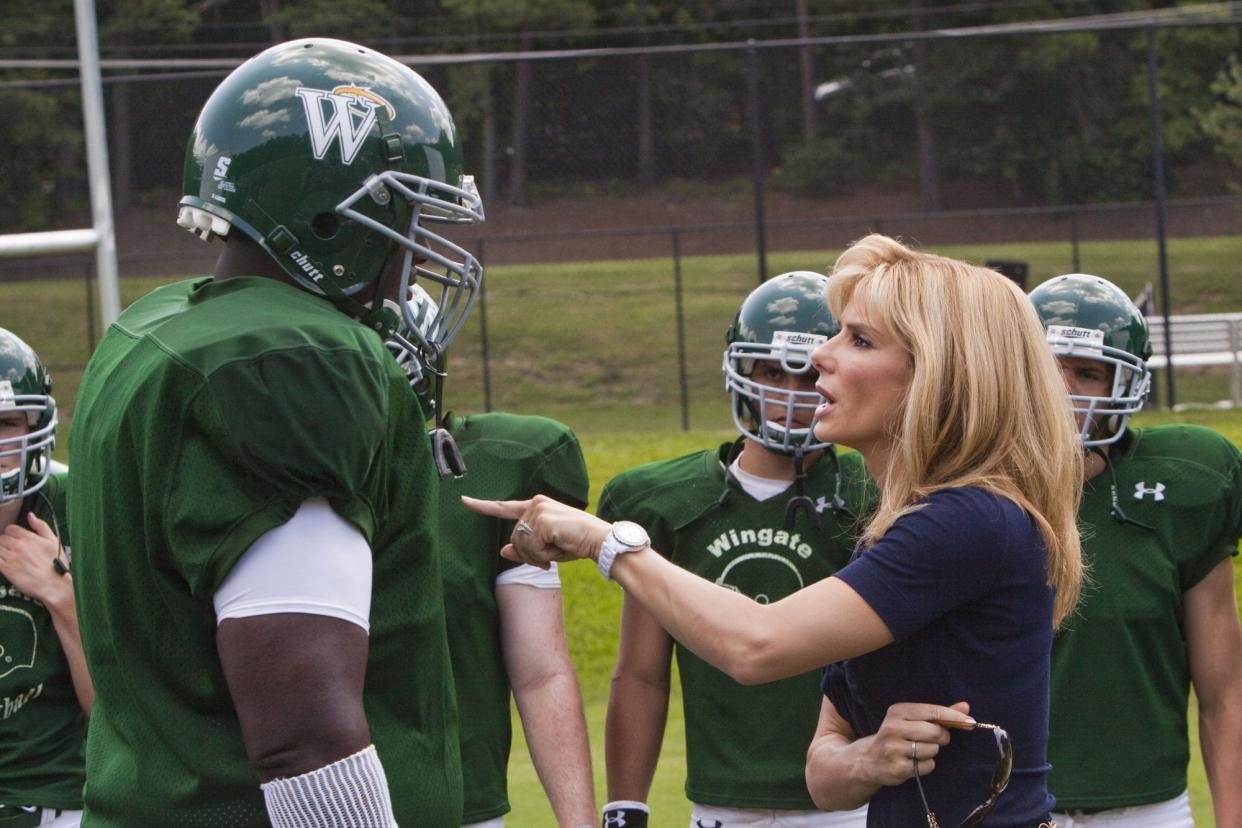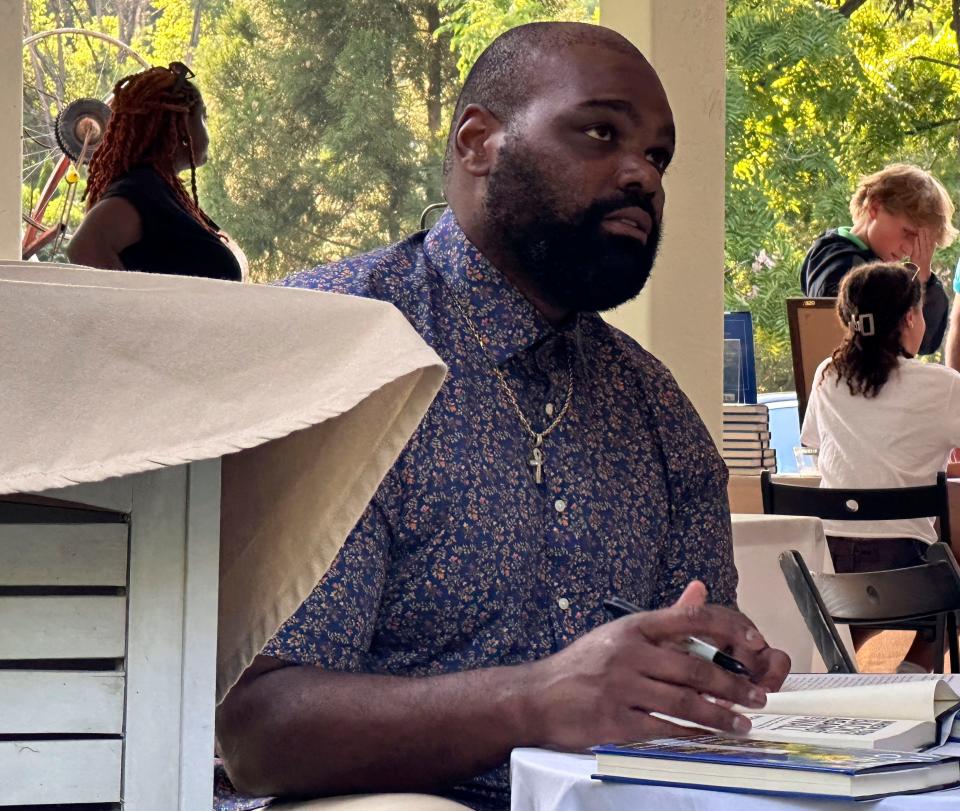Taking a closer look at the tricky business behind 'The Blind Side'

- Oops!Something went wrong.Please try again later.
- Oops!Something went wrong.Please try again later.
- Oops!Something went wrong.Please try again later.
- Oops!Something went wrong.Please try again later.
Last month, Michael Oher — the NFL star whose early life was documented in Michael Lewis’ book “The Blind Side” — filed legal action against Sean and Leigh Anne Tuohy for what amounts to financial misappropriation and fraud.
The details are more complicated than that, but the initial news caused a re-evaluation of the Lewis book and ensuing Oscar-winning movie. Was this inspiring story all a hoax, many wondered. Given that I’d never seen the film, I went in with fresh eyes and found, even absent the new allegations, there’s a few things to be concerned about.
I’ll provide a summary of the real-life case, and subsequent depictions, which can be incredibly inspiring and agonizingly stereotypical all at once.
Oher was a low-achieving student subjected to horrible traumas in his family life and the foster system. A family friend enrolls him in a Christian private school. The Tuohy family, who also send their kids to the school, observe Oher’s tragic existence and bring him into their home of luxury and privilege. Leigh Anne makes it her personal mission to get their new “son” a career in football and a shot at success in life.
Variations of this story get told a lot. What makes this different is Lewis’ access to the family — he was childhood buddies with Sean — and his technocratic discussions of the value of the left tackle position. Ever since the book’s success, Lewis has made a career of diving into the weeds of everything from short-selling stocks to COVID-19.
In Lewis’ reporting, the love between Michael and the Tuohys is genuine, and his story of overcoming adversity is amazing if not amazingly cynical; an example of how endless amounts of private money can make anyone eligible for the SEC.
Such is one perspective. Oher claims he was tricked into signing papers removing his legal ability to make decisions for himself and placing the Tuohys in charge of his affairs. He thought he was being adopted by the family. Rather, these familial figures became co-conservators (the term used by Tennessee courts to describe an appointed fiduciary) and made decisions on his behalf. Oher also avers the family made money from his likeness and withheld “millions of dollars” in royalties from the book and the film.
That lawsuit was filed in August. Since then, the Tuohys have said all proceeds from the book were split with Oher and no other financial decisions were made on his behalf. It should be noted Oher has never claimed the Tuohys had any control over money he made from the NFL, which is considerable. (Also noteworthy: the Tuohys aren’t exactly paupers — they sold their fast-food franchise empire a few years ago for over $200 million.)
Given my work as a probate practitioner, this story caught my attention. Someone who needs a conservator, by definition, wouldn’t necessarily understand the nuances of any legal proceeding. Not that the Tuohys helped clarify the point, constantly referring to Oher as family. In legal filings, they’ve started to use the phrase “like a son.”
Oher has asked for an accounting of the Tuohys' actions. A good thing, since the co-conservators failed to file necessary annual paperwork for almost 20 years that would spell out their actions. Which is a serious failing not just of the family, but the court system. The former judge was interviewed and blamed the court clerks. Real classy move.
Two sides to the story and the lack of documentation suggests much of the legal drama is untold. But I’ve heard people say this taints their appreciation of the story. Now that I’ve watched the film, I don’t know if I agree.
According to the script, it was clear to everyone that no adoption was sought. Oher seems to understand the Tuohys are making decisions on his behalf and nothing more.

Critically, there’s a segment near the end when the NCAA begins investigating Oher’s decision to attend Ole Miss. The same school as his “parents.” The investigator, portrayed as a cold, rigid bureaucrat, notes her concern that Oher’s case could start a trend. Rich boosters take in poor kids with athletic prowess, take over their decision making, then filter them into their school of choice.
Seems like a big concern! Although an organization that let schools make millions of dollars off kids while the athletes historically made nothing isn’t exactly a beacon of ethics. Regardless, this investigator articulates something very problematic and urgent.
But the concern is dismissed and Oher is allowed to do right by his parents', er, co-conservators’ alma mater. I wish the court system had been as worried about this man as the NCAA had been.
The film’s inclusion of these scenes seems to absolve itself of any responsibility to Oher’s well-being. Lewis is another story. When this lawsuit was filed, someone online dug up a Q&A where he smugly mocked Oher’s intelligence. (The clip should be easy to find.) Which calls his motives into questioning.
If Lewis is depicting the life of a childhood friend, is there sufficient distance between author and subject? Should there be? Oher claims in the lawsuit that his depiction as “slow” is inaccurate. Did Lewis exaggerate this in order to make the story more compelling? When does an exaggeration become a misrepresentation?
Lewis isn’t on trial here. Nor should he be. But an audience’s perception of a story is a very powerful thing to manipulate. There’s an obligation to not simply take a real person and distill them into a palpable stereotype. Thinly disguise the characters and do it under the pretense of fiction if needed. The outcome of the legal proceedings might end up showing Lewis wasn’t straight with his film’s subject or with the audience.
Or maybe we will never know. The Tuohys could terminate the conservatorship at Oher’s insistence, pay him some money, and everyone signs a confidential settlement that makes everything go away. It’s not very cinematic. Real life rarely is.
If these new wrinkles make you feel bad about “The Blind Side,” it’s best to remember books and movies cannot possibly provide all of the needed context to understand the depths of the real people involved. Some do their best. Sometimes, they fail us altogether.
James Owen is the Tribune’s film columnist. In real life, he is a lawyer and executive director of energy policy group Renew Missouri. A graduate of Drury University and the University of Kansas, he created Filmsnobs.com, where he co-hosts a podcast. He enjoyed an extended stint as an on-air film critic for KY3, the NBC affiliate in Springfield, and now regularly guests on Columbia radio station KFRU.
This article originally appeared on Columbia Daily Tribune: Taking a closer look at the tricky business behind 'The Blind Side'

